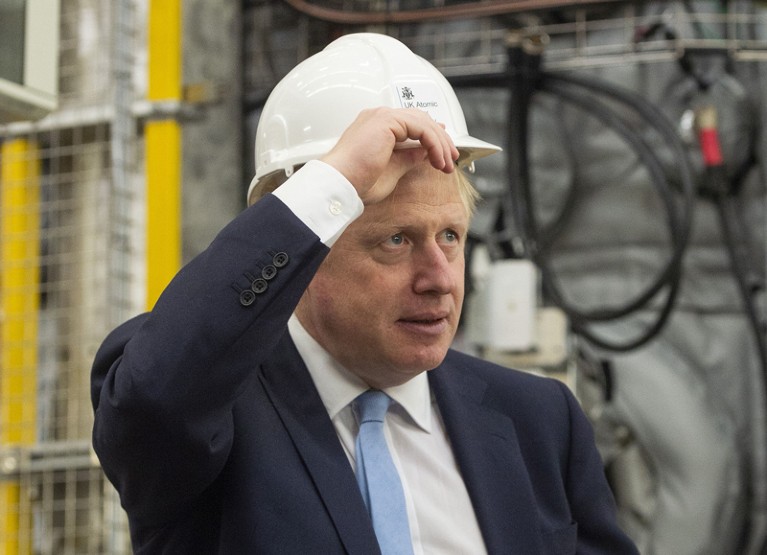
Boris Johnson could struggle to keep his post-Brexit science promises.Credit: Julian Simmonds/AFP/Getty
There’s a research group in Britain that has become a staple of the country’s news shows, and it’s called The UK in a Changing Europe. On most nights, the team of political scientists, economists and lawyers dispassionately responds to broadcasters’ questions on the impact — economic, political and societal — of the United Kingdom’s departure from the European Union.
The researchers, who are funded by the UK government’s Economic and Social Research Council — but whose work is independent of the government’s own policies — do not have an easy task. But it’s an important one, in part because the government has not yet released its own detailed analysis of Brexit’s impacts.
Lawmakers know that most researchers would like nothing more than for the United Kingdom to remain a member of the EU. That is one reason that The UK in a Changing Europe team, which is one of just a handful of independent analysts, is careful not to dwell on the impact of Brexit on the research community — but instead is keeping the focus on the bigger picture.
As this Editorial went to press, the EU had agreed to a request from the UK government to delay Brexit to 31 January 2020 — three months beyond the recent, 31 October, deadline. And with Prime Minister Boris Johnson and members of the Parliament at loggerheads over the terms of the exit, politicians were preparing for a general election. Researchers will have breathed a sigh of relief at avoiding an October ‘no-deal’, but few will be rejoicing. In what the EU calls a “flextension”, Brexit could happen before 31 January if Parliament approves a deal.
Brexit has already irreparably damaged research
And if a deal such as the one Johnson and the EU have agreed is ultimately passed, the worst case is that Britain leaves the free-trade area known as the customs union. Free movement of citizens to and from the EU and Britain will end, and Britain’s researchers might no longer be able to obtain funding from certain EU research programmes.
That is the scenario policymakers are planning for. But as this journal — along with organizations representing researchers, such as the Royal Society — has repeatedly said, fracturing more than four decades of joint working between the United Kingdom and its nearest neighbours will damage both science and society.
Aware of these concerns — and especially of the need to maintain scientific connections — the Johnson government has been talking up post-Brexit wins for research.
It plans a more favourable visa regime for students and researchers, and is shaping new funds, including a UK version of the United States’ Defense Advanced Research Projects Agency. There’s also talk of a generous European Research Council-style fund for UK researchers, should access to the EU scheme no longer be possible, and more funds to collaborate with the United States. And there’s confidence among some policymakers that the world’s researchers will continue to want to work with, and in, Britain.
Such confidence is premature. A more welcoming visa regime and extra funding will help to placate some of researchers’ concerns, but new cash depends on how much the UK Treasury department has to spend, and that relies on two things that the country does not control. The first is how much Britain will have to pay the EU for any future relationship. The second — and more important — factor is that any funding increase for research needs the UK economy to continue to grow. Although the Treasury has carried out detailed economic-impact analyses of future growth, the chancellor of the exchequer, Sajid Javid, is not yet releasing the results.
But thanks to modelling from UK in a Changing Europe, we know that, under Johnson’s proposals, income per capita is projected to be 2.5% lower on average than if Britain remained an EU member, based on economists’ projections of income from trade and reduced immigration. The team also says that when trade falls, which it will in the initial period after Brexit, that also reduces productivity. After factoring productivity losses into the models, post-Brexit income per capita could be between 2.3% and 7% lower.
These figures call into question assumptions that Brexit will bring an economic dividend. And without such a dividend, the government will probably struggle to keep its promises of increased research funding.
As the Brexit saga rolls on, researchers need to continue their objective analyses of its potential impacts, and to call out what could be prematurely optimistic promises. They must highlight the risks to research and ensure that none of these issues is trampled on in the stampede to get a deal in place.

 Brexit has already irreparably damaged research
Brexit has already irreparably damaged research
 Paul Nurse on Brexit: ‘UK is sleepwalking into a disaster’
Paul Nurse on Brexit: ‘UK is sleepwalking into a disaster’
 UK science minister Jo Johnson resigns amid Brexit drama
UK science minister Jo Johnson resigns amid Brexit drama
 What Boris Johnson’s leadership could mean for science
What Boris Johnson’s leadership could mean for science






